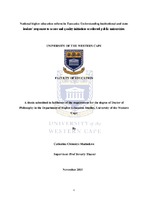| dc.description.abstract | Like many universities across the globe, African universities were not exceptional in so far as they were under the control of their nation states. While studies have explored the relationship between the State and the universities, this thesis argues that notwithstanding the debate around the issues of universities’ continuous demand for autonomy as against the pressure for accountability, universities in Africa can also challenge the state in hidden ways especially around issues of higher education policy. In substantiating this argument, this researcher has employed Foucault's (1979) concept of governmentality as the 'conduct of conduct' - and its subcomponent of power which points to the multiplicity or fluidity of power as originating from diverse sources. Within the exercise of power, institutions have to make the choice of freedom and resistance to state expectations. In this study, the public universities in Tanzania are expected to be responsive to a national priority poverty reduction policy (the MKUKUTA) that reflects the access and quality initiatives for the reform of higher education institutions. However, there is evidence in literature that wide consultation is one major aspect of the policy formulation, especially the poverty reduction policy paper. This researcher argues that in spite of the evidence in literature in respect of wide consultation, the case of public universities in Tanzania was quite different at systemic level. Aside from the issue of co-ordination at systemic level, this study also argues that the state is interested in regulating public universities to ensure their responsiveness to the MKUKUTA objectives. Drawing on a Foucauldian discourse, this researcher understand the state's choice of using funding for universities as a form of surveillance or panopticon to regulate institutional activities to fit the policy objectives. Even though the state uses funding as a form of surveillance, this researcher argues that the public universities, in their exercise of power, within the fluidity or multiplicity of power can choose to freely regulate their institutional activities that are aligned to the MKUKUTA objectives to their own advantage to raise an additional internal funding stream. This study is based on a qualitative research approach and indirectly also draws on the methodological framework of social constructionism. Being a qualitative study, it utilized structured interviews to engage respondents from three public universities, state agencies, international aid partners and the policy secretariat to understand the extent of responsiveness of the public universities to the mandate of the MKUKUTA for higher education. | en_US |

